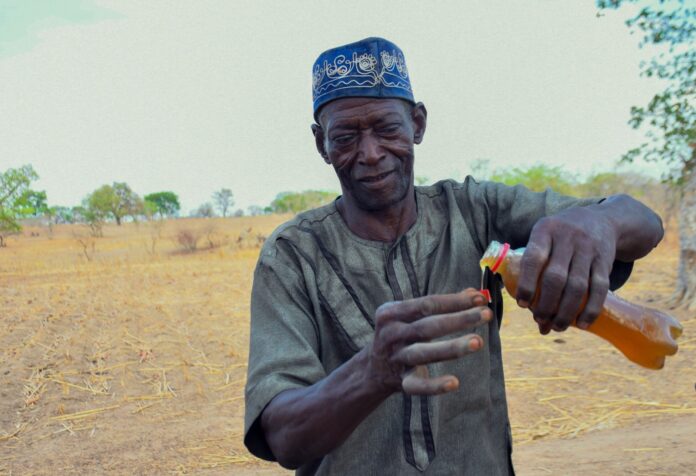But for the World Vision’s Re-greening Projects, many people especially retired workers would have remained jobless after the short farming season.
Apart from Job creation, the project is also stabilising the vegetation of the area and helping to fight desertification.
Mr John Akugre, a 69-yearr-old Civil Servant said Bee-keeping (Apiculture) and agro-forestry were helping him to meet his children’s food, educational, health, and nutrition requirements.
He said he would have faced challenges providing for his family and meeting household responsibilities.
“Life would have been challenging for me in retirement if I were not engaged in bee-keeping and agroforestry,” he said.
Mr Akugre said he was currently managing eleven (11) colonized beehives in his Azupunpun community forest.
“Community forests were restored and protected under World Vision’s farmer-managed natural regeneration (FMNR) and assisted natural regeneration (ANR) initiatives. Thanks to the Re-greening Africa Project, I am among over 11,000 lead beneficiary farmers in the Bawku West and Garu-Tempane Districts in the Upper East region who were identified, selected and trained by the Project”.
He said each of the colonies hosted not less than 5000 honeybees and he had established nurseries to raise seedlings earned a lot of money engaging in these activities.
He said apart from benefiting from honey and supplying seedlings, he also expanded his farm and increased his yields. “I increased my income and improved my household food security. I can meet my household’s financial, food, and nutrition needs with ease”, he said.
“I had no idea how crucial beekeeping and agroforestry were to protecting the environment and sustaining human livelihoods until I participated in the Re- greening Africa Project. Thanks to World Vision Ghana for the opportunity,” he said. Through the Re-greening Africa Project, World Vision Ghana introduced farmers in the Bawku West and Garu-Tempane Districts to FMNR, nurseries management and tree planting techniques aimed to reverse land degradation, improve soil fertility through agro-forestry, and build community and farmer resilience to climate change.”
Mr Akugre said the practice of FMNR contributed to establishing community-protected forests laying a solid foundation for the enactment and implementation of community by-laws against bushfires and indiscriminate wood extraction.
He said it had resulted in improved environmental sustainability in the area and the by-laws had also resulted in increased public awareness of the dangers of bushfires and the need to preserve the local environment with the community uniting to promote sustainable wood extraction and the use of natural resources.
The Re-greening Africa Project Funded by the European Union and World Vision Australia trained and formed 11,920 lead farmers and fire volunteers to manage bushfires across project sites.
It also trained 17,550 farmers on conservation agriculture practices and planted more than 200,000 seedlings cumulatively across project communities in its 5 year implementation period. “We stopped cutting down trees and burning bushes.
“Now we have forests where we practice beekeeping, which also serves as fodder for our animals.
“Lead farmers in more than 350 project communities enjoyed multiple benefits: recovery and preservation of biodiversity, improved soil fertility, increased environmental agility, thanks to community by-laws, reduced tree felling and bushfires, and increased tree planting. “My life has changed. My attitude towards the environment has also improved for the better.
“Thanks to World Vision for providing me with skills and knowledge in beekeeping and agroforestry,” Akugre said.
Akugre commended World and its partners for introducing farmers to beekeeping and agroforestry, which had enabled him to buy farm inputs to increase crop yields, open a bank account, provide clothing, and buy additional animals for keeping.
“Last year, I sold 4000 tree seedlings of diverse species to groups, communities, and individuals and made over GHS 10,000.
”This enabled me to open a bank account where I can save money,” he said.
Re-greening Africa project funded by the European and World Vision Australia was an ambitious 5-year project that sought to reverse land degradation among 500,000 households and across one million hectares in eight countries in sub-Saharan Africa including Ghana.
Re-greening efforts reclaim Africa’s degraded landscapes by incorporating trees into croplands, communal lands, and pastoral areas.
It was implemented by World Agroforestry (ICRAF), World Vision Ghana: Catholic Relief Services, and National and Local Government Agencies and communities.





